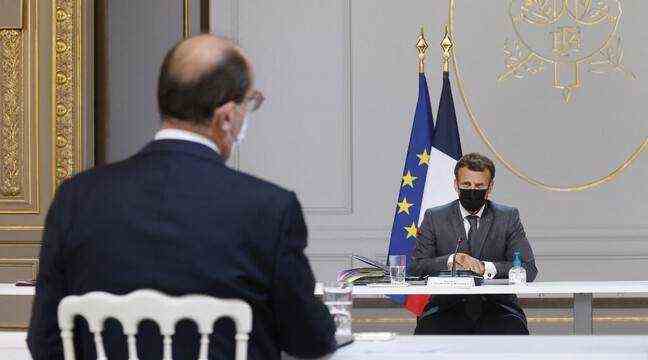Faced with the debacle of LREM in the first round of the regional, and the new failures expected in the second round this Sunday, Emmanuel Macron could be tempted to reshuffle his government, according to
our colleagues from France Info. According to this media, Emmanuel Macron plans to announce the main axes of his last year in office in July, possibly by a speech between the 7th and the 14th of the month (the president spoke only once on the day of the national holiday, in 2020). The opportunity would then arise to also change some ministers, while many members of the government sent to the regional front did not even pass the first round.
Does a reshuffle so close to the presidential election have any interest? For Stéphane Rozès, political scientist and president of CAP (Advice, analyzes and perspectives), it even has two. Symbolically first, “it allows to open a new sequence and to acknowledge receipt of the ballot boxes, without making repentance either.” An image of listening to the people all the more important for a party and a president often accused of being above ground or disconnected from the population.
Empower government
Politically then, “Emmanuel Macron is becoming more and more a candidate than a president,” notes Stéphane Rozès. Consequently, it needs a strong and solid government, able to stand without it, more and more distant from the Elysee and the executive and more and more in campaign in the months to come. However, currently, this is not really the case, the latest evidence on Wednesday with the sharp pass of arms between the Minister of Justice Eric Dupond-Moretti to Gerald Darmanin, Minister of the Interior. The first accused the second of “treason” for having “congratulated” Xavier Bertrand, candidate and incumbent president (LR) leading in Hauts-de-France after the first round.
A situation that makes the task impossible for Emmanuel Macron. Stéphane Rozès: “The current disputes show that the government is not held. The candidate Macron needs a government that knows how to self-manage. Hence the need for a possible reshuffle.
A maneuver not necessarily relevant
The maneuver is not new, but it has not always been a guarantee of efficiency. Bruno Cautrès, CNRS researcher and teacher at Sciences Po, resitates: “All governments are making changes in the home stretch of the presidential election. This is a case that we already know a lot, which does not show a very significant effect. The rare consequences observed would even be generally negative according to the researcher: new ministers who do not even have time to assert themselves, a feeling of instability and a loss of reference for the electorate. As for the idea of sending signals to potential voters, here too, things are not so simple: “It is not enough to appoint a minister from the center-left to convince the voters of the center-left. . For that, we have to carry out center-left policies, ”Bruno Cautrès says. A political turnaround impossible to put in place in a few months.
The only change that can have an impact is that of Prime Minister. To strengthen the government, as portrayed by Stéphane Rozès, and to send a real message to voters. But this solution is not without risk: “Jean Castex was appointed especially for the coronavirus, recalls Bruno Cautrès. Parting with them as the Delta variant threatens and a fourth wave is possible in September is very risky. “
What to choose ?
Ditto for certain ministers, admittedly totally swept away during the regional meetings, but essential for political stability. Bruno Cautrès takes the example of Eric Dupond-Moretti: “He is known and is engaged in serious reforms of the justice system. It’s hard to consider making him go. In any case, it could be badly perceived. “
And then basically, does this regional debacle really matter, in an election where two-thirds of the French did not vote? “We cannot say that this election does not count for all that, and this abstention is very political. Of course, this is not the same logic as the presidential election, of course the candidacy of Emmanuel Macron is not called into question, but we must respond to this abstention “, defends Stéphane Rozès. To act, not to act, the equation is therefore still insoluble and the effectiveness of each lever uncertain. One more challenge for the political author of “at the same time”.

